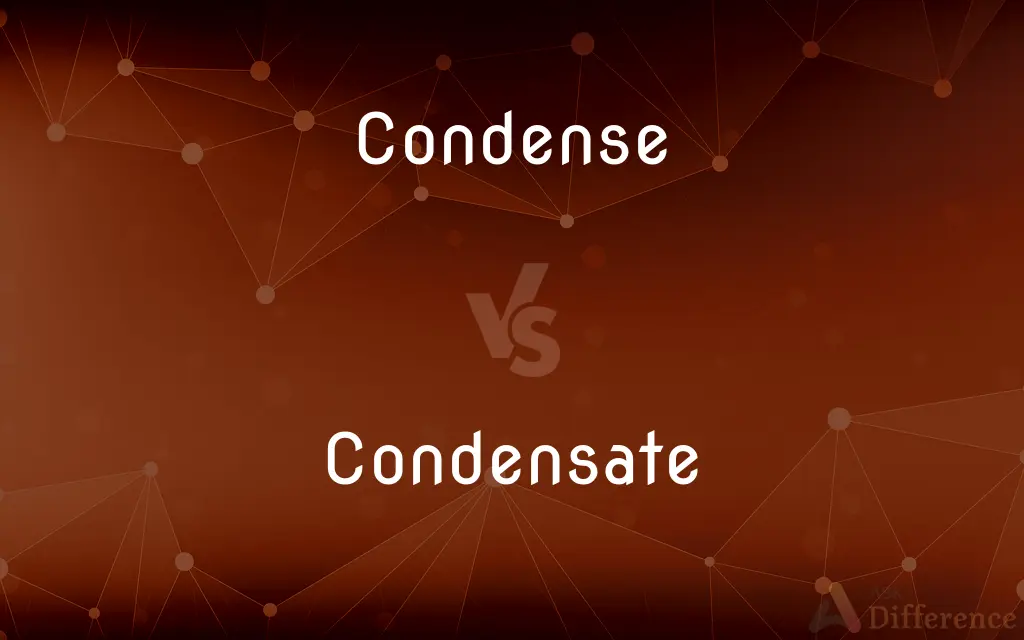Condense vs. Condensate — What's the Difference?
By Maham Liaqat & Urooj Arif — Updated on February 26, 2024
Condense refers to the process of making something denser or more concentrated, while condensate is the product of condensation, typically a liquid that has formed from gas or vapor.

Difference Between Condense and Condensate
Table of Contents
ADVERTISEMENT
Key Differences
Condense is a verb that describes the action of making a substance denser or more compact, or the process of changing a gas or vapor into a liquid. This term is widely used in both physical sciences and in metaphorical contexts to describe the process of making information, writing, or speech more succinct. Condensate, on the other hand, is a noun that specifically refers to the liquid produced when a gas or vapor undergoes condensation. It is primarily used in scientific contexts, particularly in chemistry and physics, to describe the end product of the condensation process.
To condense something means to reduce it in volume or extent by compressing it or summarizing it. There is no equivalent usage of condensate in such contexts, as condensate remains strictly a term for the physical product of condensation.
The process of condensation can be observed in various everyday phenomena, such as the formation of dew on grass or the fogging of a window in a warm room. The liquid that forms as a result of condensation is what is referred to as condensate. Conversely, when discussing the action that leads to these phenomena, such as the cooling of air to the point where it can no longer hold all of its water vapor, we use the term condense.
Condense and condensate can also be differentiated by their roles in scientific experiments or industrial processes. For example, in the distillation process, the vapor is cooled and condensed back into a liquid, which is then referred to as the condensate. This distinction highlights the different phases of the process (condense) and the outcome of the process (condensate).
Understanding the difference between condense and condensate is crucial for clear communication in both scientific and everyday contexts. While condense focuses on the process or action, condensate is concerned with the product or result of that process.
ADVERTISEMENT
Comparison Chart
Part of Speech
Verb
Noun
Definition
To make something denser or more concentrated; to change from a gas or vapor to a liquid.
The liquid that forms when a gas or vapor cools and becomes liquid.
Usage Context
Used in scientific, literary, and general contexts to describe a process or action.
Primarily used in scientific contexts to refer to the product of condensation.
Examples
Condensing a book into a summary; condensing vapor into liquid.
The liquid formed on a window from condensation; the liquid collected in a distillation apparatus.
Focus
The action or process of becoming denser or changing state.
The outcome or product of the condensation process.
Compare with Definitions
Condense
To summarize or make more succinct.
She condensed her argument into a few key points.
Condensate
Liquid formed from the cooling of a gas or vapor.
The condensate collected in the jar was clear.
Condense
To concentrate a solution by removing solvent.
The lab technician condensed the solution by evaporating excess water.
Condensate
In industrial processes, the liquid recovered from vapor.
The refinery processed the condensate into various fuels.
Condense
The process of becoming more compact or concentrated.
The lecture was condensed into a 20-minute presentation.
Condensate
The product of condensation in scientific experiments.
The condensate was analyzed for impurities.
Condense
To reduce in volume or extent by making denser.
The author condensed the novel into a short story.
Condensate
Dew or water droplets formed by condensation.
Morning condensate covered the spiderweb.
Condense
In physics, to change from a gas or vapor to a liquid.
Water vapor in the air condenses to form dew.
Condensate
The outcome of a cooling process in nature or machinery.
The air conditioning unit produced a significant amount of condensate.
Condense
To make more dense or compact
Gravity condensing matter into stars.
Condensate
(physics) A liquid that is the product of condensation of a gas, i.e. of steam.
Condense
To make more concise; abridge or shorten
Condensed the list of guests.
Condensate
Liquid collected by condensation.
Condense
To combine or unite (as two chemical substances) with or without separation of some unimportant side products.
Condensate
The liquid resulting from condensation of a gas, such as a product of distillation or another method of separation.
Condense
Undergo condensation; change from a gaseous to a liquid state and fall in drops;
Water condenses
The acid distills at a specific temperature
Condensate
The part of a natural gas mixture that consists of volatile hydrocarbons and can be easily condensed.
Condense
Make more concise;
Condense the contents of a book into a summary
Condensate
Atmospheric moisture that has condensed because of cold
Condense
Remove water from;
Condense the milk
Common Curiosities
How are condense and condensate used in industry?
In industry, condense refers to processes that concentrate substances or turn gases to liquids, while condensate is the liquid product collected from such processes.
Can condensate be used in a non-scientific context?
Condensate is primarily used in scientific contexts to refer to liquid formed from gas or vapor; it's rarely used metaphorically or in non-scientific contexts.
What is the main difference between condense and condensate?
Condense is a verb describing the action of making something denser or the process of gas turning into liquid, while condensate is a noun referring to the liquid product of this process.
What role does temperature play in condensing and condensate formation?
Temperature reduction is key in turning gas or vapor into a liquid (condensing), leading to the formation of condensate.
How is condensate handled in environmental engineering?
In environmental engineering, condensate must be properly collected and treated, as it can contain pollutants.
Is condensing always related to physical changes?
While often related to physical changes (gas to liquid), condensing can also refer to making information or materials more succinct or concentrated.
Can condense be used in culinary contexts?
Yes, condense can describe processes like reducing sauces to make them thicker, but the product isn't typically called condensate in this context.
How does condensation relate to condense and condensate?
Condensation is the process that involves condensing (verb) a gas or vapor, resulting in condensate (noun).
What is the significance of condensate in natural processes?
Condensate plays a crucial role in the water cycle, contributing to groundwater replenishment and the hydration of ecosystems.
Can something condense without forming condensate?
In physical terms, condensing usually results in condensate. However, in metaphorical use (e.g., condensing information), there's no physical condensate.
Share Your Discovery

Previous Comparison
Ruler vs. Rule
Next Comparison
Denumerable vs. CountableAuthor Spotlight
Written by
Maham LiaqatCo-written by
Urooj ArifUrooj is a skilled content writer at Ask Difference, known for her exceptional ability to simplify complex topics into engaging and informative content. With a passion for research and a flair for clear, concise writing, she consistently delivers articles that resonate with our diverse audience.














































